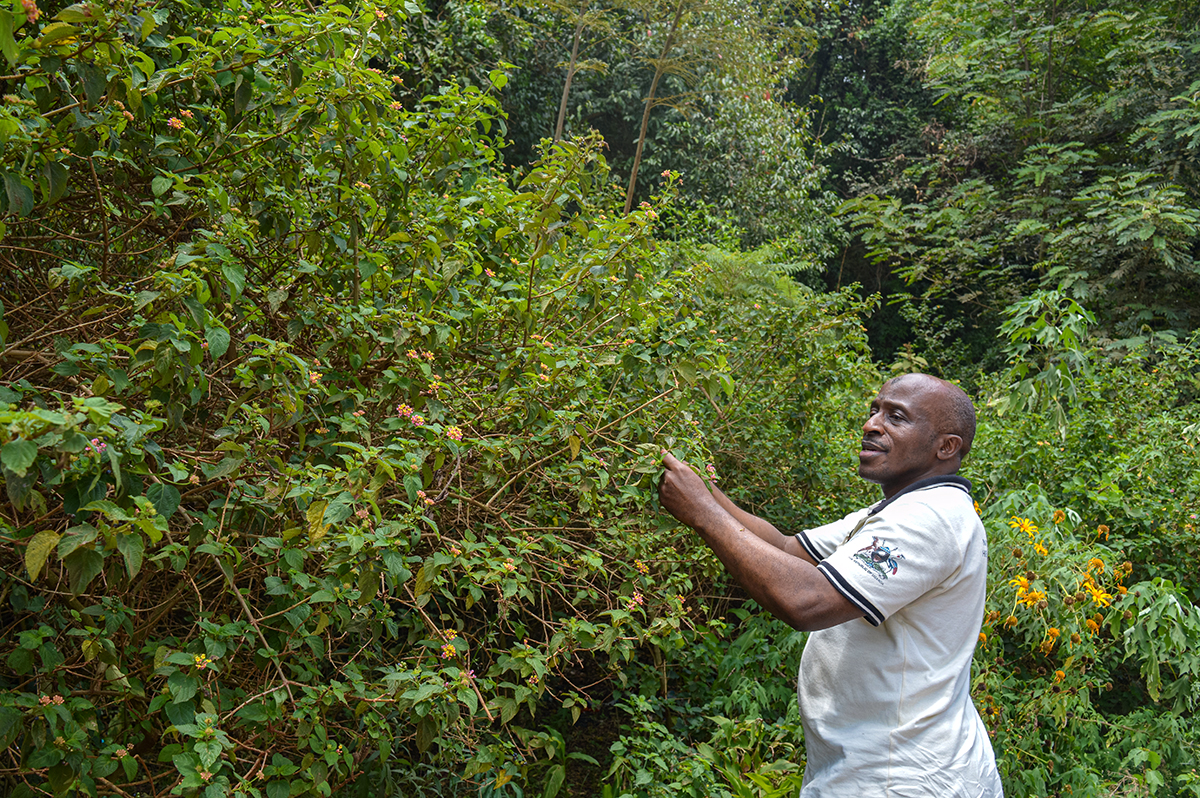
Nakisanze Segawa, GPJ Uganda
Hamza Nsubuga Watu, a traditional herbalist, watches as his goats feed in Kyengera Village, Wakiso district. Any plant the goats eat could become the focus of his next research project and add to his knowledge of traditional medicine.
KAMPALA, UGANDA — Hamza Nsubuga Watu watches closely when his goats feed. The plant the goats choose to consume could spur the traditional herbalist’s next research project.
“I work and sacrifice hard to be knowledgeable about some of the plants I turn into herbal medicine and give to my patients to manage and treat their illnesses,” he says.
Watu treats patients for a variety of illnesses and ailments, including malaria, ulcers, low libido, the flu and fertility issues. It can take Watu from months to years to perfect research trials, which often require consultations with other herbalists. He tries many of the plants first on himself, administering them when he feels ill.
But Watu worries that a new bill mandating the regulation of herbal medicine will strip him of the knowledge he acquired through his paternal aunt and 13 years of personal research.
“The new bill requires me to share that knowledge, which I worry could result into stealing my patent rights,” he says.



Watu is not the only traditional herbalist who’s afraid that the Traditional and Complementary Medicines Bill, 2019, passed by Uganda’s parliament in February and awaiting presidential assent, will put their intellectual property at risk.
Sarah Opendi, Minister of State for Health, says the bill is a response to the increased reports of fraudulent herbalists selling ineffective herbs to patients. More than 60% of Ugandans take traditional medicine due to its accessibility and effectiveness, she says, but some herbalists mix drugs such as antiretrovirals and Viagra in with the herbs and sell it to patients without disclosing the ingredients.
“There are a number of quacks who masquerade as herbalists and have come up with concoctions that have been found to have no capacity to cure,” she says. “The bill is a step to improving health delivery and uprooting the quacks.”
As part of the bill, a council will register and grant operational licenses to traditional herbalists, says Opendi. But before the traditional herbalists are licensed, they must send their herbs to the Natural Chemotherapeutic Research Laboratory (NCRL), a government organization, to confirm the herbs manage and treat the illness that the herbalists claim they do. Once verified, the herbalist will go before the National Drug Authority (NDA), a government drug regulatory body, to recommend the herbs to the council. The process depends on the herbalists’ cooperation and could take months to complete, says Opendi.
Opendi says the bill provides herbalists the freedom to identify medicinal plants, which are then taken to the NCRL and assessed for efficacy and toxicity to ensure that they are safe for human consumption.
But to verify the medicine’s effects, traditional herbalists will have to share information on the contents, says Grace Nambatya Kyeyune, executive director of the NCRL.
This requirement is causing concern among herbalists.
Abdul Karim Musasizi, secretary general of National Council of Traditional Herbalists Association (NACOTHA), says disclosing the formulas of the medicine to NCRL researchers puts their knowledge in a vulnerable position.
“The bill doesn’t protect our knowledge and innovation in any way,” he says. “So when we share this knowledge and formulas to NCRL as the bill suggests, how sure are we that the researchers will not steal our knowledge?”
Musasizi says there has been theft of traditional medicinal knowledge by both local and foreign researchers from China, Europe and the U.S., who claim that they seek to improve the quality of medicine.
Baguma Joseph, executive director of THETA, a local NGO that researches traditional medicine, says he is aware that this theft takes place. But since scientists and researchers from other countries often travel to see traditional herbalists without any formal arrangements, it is challenging to prove that theft occurred.
“I know a traditional herbalist in Jinja district who had a good formula for treating malaria,” says Joseph. “He was given 200 million shillings by a foreign scientist for giving up his knowledge about the formulation of his innovation.” Joseph says the herbalist may have been naïve about patent rights and thought the money (about $54,396) to be sufficient.
The Industrial Property Act, passed by the Ugandan government in 2014, prohibits patent rights for pharmaceutical assets, which includes medicines created by traditional herbalists. ButAgaba Gilbert, manager for intellectual property at the Uganda Registration Service Bureau (URSB), says creators of traditional herbal medicine can protect their process under the Trade Secret Protection Act. This gives them the right to withhold information on the formulation of their medicine in order to ensure the protection of their brand.
NCRL’s arrangement with URSB allows herbalists to access information on how much of the formula they need to share, saysNambatya.
But Emilly Nakayima, an herbalist who supports the bill, wonders how effective it will be if herbalists retain the right to conceal information about the content and formulation of their medicine.
“This will continue the existence of quack doctors who treat people with fake medicine,” she says. “Yet, our industry contributes greatly to the health sector.”
According to the bill, an ethics and intellectual property rights committee will be established to ensure protection of practitioners’ intellectual property rights. Opendi says the committee was included in the bill because concerns surrounding intellectual property were “raised by herbalists and some members of Parliament.” She hopes the committee will determine best ways to protect traditional knowledge.
But herbalists like Watu remain skeptical as they wait for the committee to be formed.
“There is significant mistrust with what the bills is really intended for,” Watu says. “Until everything is cleared and the benefit is mutual on rights of intellectual property, the knowledge will be concealed and the contents of the medicine kept secretive.”






